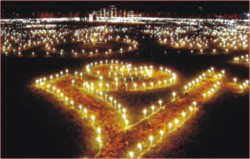Striking A Chord
Showcasing our Identity
Elita Karim
 |
photo : star |
The World Cup opening finally took place last week and it was a blast! The stadium filled with thousands of spectators cheered at the mind-blowing displays showcased by the respective representatives of the participant countries. While team India made everyone dance with traditional Marathi and Punjabi tunes, Srilanka dazzled everyone with its royal colours and motifs. Everyone cheered on harder when Bangladesh came up on stage to showcase its traditional art forms, dances, complete with costumes and music composed by Ibrar Tipu. A sudden hush, however, spread through the crowd once the history of the country was showcased. As a part of the language movement, a life size Bangla alphabet appeared on stage while the movement was dramatised on stage on 'Amaar bhaiyer rokte rangano, ekushe February, aami ki bhulite pari.' Not only did the silence carry a certain amount of poignancy but also a lot of pride. The display ended with the song 'O amaar desher maati,' with everyone singing along. Not surprisingly enough, many had tears in their eyes, if not for the actors on stage re-constructing the sacrifice of the martyrs, but for the sense of belongingness and identity that their sacrifice has brought for the country.
There was a time, in the near past, when learning or using foreign languages for various purposes were discouraged by many, so that the significance of the Bangla language and the sacrifices made by the martyrs would sink in. Only a handful, belonging to a particular crust of society would study a foreign language of their choice. However, times have changed. The new era has brought with it an attitude amongst the general public, which pertains to accepting foreign cultures, languages and ideas at the same time preserving their own identity and traditions as well.
A young student today is not only secured about his own identity, fluent in Bangla, able to express himself or herself in his or her own language, proudly boasting his or her own culture in the international arena, but is also ready to appreciate a culture absolutely foreign and in many cases, bilingual or multilingual. With new media, advertisement and marketing policies and the telecom industry, creating an explosion in the field of media and communications in Bangladesh, the society has changed a great deal today in terms of becoming more accepting, rather than abolishing or eliminating elements that are different and foreign.
It is time that we finish the job that our predecessors had begun during the language movement. While they achieved the identity and established one language for the people of Bangladesh, we should move a step forward and spread the significance of this language and showcase the rich culture and elements that come embedded on the international platform. That would truly build global individuals in the country.
|
